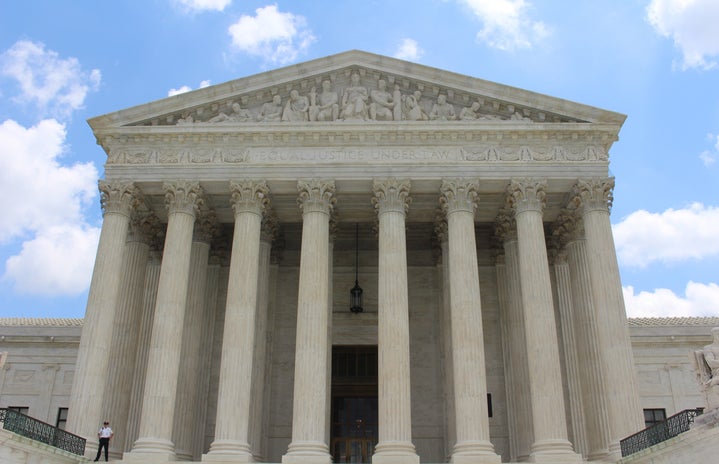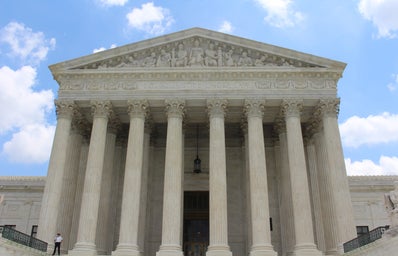The recent passing of Ruth Bader Ginsburg has sparked a true appreciation of her life and career. Justice Ginsburg spent her entire life fighting for the rights of marginalized communities and continued this work in the highest court of the land. With the death of such a pioneer and titan, eyes have now turned to who her replacement will be.
Seven days after the death of Ruth Bader Ginsburg, Trump announced Amy Coney Barrett as his official nominee to fill the spot of the Supreme Court Justice. This has been received as politically controversial, as he announced his nominee only 38 days before the election with hopes of getting her confirmed before November 4th. During the first presidential debate, Joe Biden made it clear that he believes President Trump trying to fill the spot right up against the election is not what’s best for the American people. He stated that whoever is chosen on election day should be allowed to fill the seat, as that will be who the American people think best represents them. Kamala Harris doubled down on this opinion during the vice presidential debate last Wednesday, bringing up the historical example of Abraham Lincoln choosing not to fill a Supreme Court seat because it became vacant just 27 days before the election of 1864.

For some political figures, Barrett’s nomination is controversial. New York Senator and minority leader Chuck Schumer recently tweeted: “I am not going to meet with Judge Barrett. Why would I meet with a nominee of such an illegitimate process and one who is determined to get rid of the Affordable Care Act?” Kirsten Gillibrand, the other New York Senator agreed, tweeting: “I will not meet with Judge Amy Coney Barrett. This nomination process is illegitimate. I refuse to participate in the further degradation of our democracy and our judiciary.” Other Senators, such as Connecticut Senator Richard Blumenthal and Hawaii Senator Mazie Hirono have also stated they will not meet with her despite it being customary.
However, Trump is well aware that to confirm Barrett, he needs only the Senate majority, which, due to the current breakdown of the Senate (53 Republican Senators, 45 Democratic Senators, and 2 Independent Senators) should be entirely possible for him to get. Her confirmation, paired with the absence of Ruth Bader Ginsburg, will shift the Supreme Court to the right for the foreseeable future, with three liberal-leaning justices and six conservative-leaning. This means that even if a conservative-leaning judge comes down on the liberal side of a ruling, as Cheif Justice Roberts has done before concerning issues such as abortion, LGBTQ rights, and immigration, that may still not be enough for the court to rule on the liberal side.
Democrats, including Joe Biden, have voiced two main concerns about Barrett’s appointment. The first: that she will vote to strike the Affordable Care Act, the second: that she will vote to repeal Roe v. Wade. The first concern is entirely legitimate, as Barrett has attacked both the Affordable Care Act and the Supreme Court decision to uphold it. In 2012, she signed onto a letter titled “unacceptable” which condemned the ACA’s requirement that insurance plans offer contraception by stating that it was an infringement on religious liberty. She also agreed with Justice Scalia’s dissent statement about King V Burwell, in which he stated the court distorted the word of the constitution to find the ACA’s Medicaid expansion constitutional. Due to her issues both with the ACA and the prior Supreme Court ruling, if given the chance to strike down the Affordable Care Act, she will take the chance. Unfortunately, this chance might be given. The Supreme Court has agreed to hear such a case in their upcoming term (entitled California v. Texas) there are grounds to believe she would vote to repeal it. This is especially prevalent due to the pandemic, as repealing the ACA would lead to over 23.3 million Americans being stripped of their healthcare.
The concerns around Roe v. Wade may be equally legitimate. Barrett grew up in a Catholic household and remains part of the “People Of Praise” — a small religious community that has come under scrutiny recently. She has also been very open with her beliefs about contraception and her negative views on abortion. In 2006, she signed a newspaper ad calling for the end of Roe v. Wade, referring to it as “barbaric” and was a member of “University Faculty for Life” while working as a law professor at Notre Dame. Many pro-life groups have been outspokenly supportive of her, and Trump himself said during the presidential debates in 2016 that he intended to overturn Roe v. Wade, stating: “That will happen automatically, in my opinion, because I am putting pro-life justices on the court.” Because Barrett has only served on the 7th circuit for three years, it is hard to glean much from her voting record. She has stated that personal beliefs should not stand in the way of doing justice, but based on her track record, the concerns people have about the repeal are not unfounded.
It also bears mentioning that she is a disciple of the late Justice Antonin Scalia, an icon for conservatives who opposed Roe v. Wade because they believed it should be up to the states to decide abortion laws. Scalia was an advocate for originalism; the idea that the constitution should be interpreted as it was meant at the time it was ratified. This is in contrast to the more popular view of “living constitutionalism” which holds that the meaning changes as society changes. Amy Coney Barrett has stated that she is also an originalist, which may give us some insight into her voting process.
What now remains is for the Senate to confirm her nomination. Trump will most likely push to have the Senate vote before the election, however it is still possible for them to vote on the nominee until January 20th in what is called a “lame-duck session” (the date of the inauguration). After the election, if Biden wins and Amy Coney Barrett is confirmed, he may choose to “pack the court”, meaning that he would appoint another 10th judge to sit on the Supreme Court. In order to do this, he would simply need to pass the bill through both houses of Congress and sign it. However, neither he nor Kamala Harris have spoken about whether or not this is their plan and have dodged questions about it during their respective debates.
While this election season may seem as though it’s flying by with new stories continually being churned out, it’s important to take stock of where you stand in all of it. Do not fall into the trap of thinking that your voice doesn’t matter. As always, it is important to contact your state and local representatives to let them hear where you stand on the issues. If you do not know who your representatives are and you wish to contact them, you can find their information on it here. If you are 18+, you can still register to vote at Vote.gov! Make sure that your voice is heard this upcoming election season, because believe it not — it matters.
For a deeper look at Amy Coney Barrett’s past as it relates to LGBTQ rights and access to abortion, check out https://civilrights.org/resource/oppose-confirmation-amy-barrett/.




